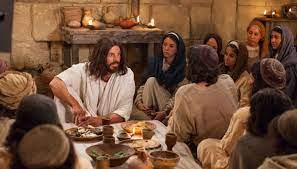HOMILY WEEK 29 03 – Year I
Instruments of Righteousness
(Rm 6:12-18; Ps 124; Lk 12:39-48)
*********************************************
“Present yourselves to God as instruments of righteousness.”
That sentence from the first reading to the Romans, the reading itself and the gospel combine to offer us a clear two-pronged message: let go of sin and do the will of God. In other words, be holy and serve the Lord as just instruments of righteousness.
St. Paul is very direct and emphatic in first of all reminding us that sin and selfishness has no more place in our lives. By our faith in Jesus and baptismal participation in his death and resurrection, we have died to sin and now are to live for God alone. Another way of looking at this spiritual reality is the fact that after we die, we can no longer sin. Faith and baptism are a death before death; we die to sin before we die. What will happen by nature after we die, is supposed to happen to us spiritually by our baptism and life in Christ before we die – today, now.
That happens best, I believe, by a sincere examination of conscience, a searching and fearless moral inventory, as Step 4 of A.A. puts it, and a thorough, humble and honest confession of all our sins to God, ourselves and another human being (Step 5).
But that is only half the process. Unfortunately, in the Church we tended to focus only on being forgiven, wiping the slate clean, and then going out to commit the same sins all over again. We neglected the dimension of healing that is supposed to be part of the sacrament of reconciliation. Step 6 provides it with the words “Get ready to have God remove all our defects of character” that is followed by Step 7 “Humbly asked God to remove all these defects of character.” That is healing, when we, with great humility, faith and self-awareness, come to God asking God to take away our painful emotions such as anger and resentment, our character defects such as false pride, stubborn self-will, self-righteousness, tendency to judge and even our addictions, whatever they may be.
The essence of all this is called theosis, or a process of divinization, of being transformed into the likeness of Christ himself. As St. Paul puts it in 2 Corinthians 3:18, “And all of us, with unveiled faces, seeing the glory of God as though reflected in a mirror, are being transformed into the same image from one degree of glory to another; for this comes from the Lord, the Spirit.” That, my friends, is what the first part of life in Christ is all about – becoming our truest selves in God’s eyes.
 The second part of our life in Christ is basically living that out through humble, loving service, doing God’s will, always and at all times, so that we will not be surprised when Jesus does come again, for we will always be ready.
The second part of our life in Christ is basically living that out through humble, loving service, doing God’s will, always and at all times, so that we will not be surprised when Jesus does come again, for we will always be ready.
Doing God’s will in our lives is very simple: all we have to do is keep the commandments that Jesus gave us, and live the Beatitudes. I like to summarize the commandments as follows: love God with our whole being, love our neighbour as we love ourselves, love one another as Jesus has loved us, and love our enemies by forgiving them from the heart.
The Beatitudes call us to be humble, compassionate, gentle, just, forgiving, pure, peaceful and persevering. Micah, in the Old Testament, put it this way: act justly, love tenderly and walk humbly with our God.
There are many of our brothers and sisters who are doing this admirably and are an inspiration to us all – persons such as Ron Rolheiser OMI who has been writing a column on spirituality for almost a hundred Catholic newspapers around the world for over 25 years; Richard Rohr OFM who runs the Living School of Christian living out of the Centre for Action and Contemplation in New Mexico, and presently has sparked a whole men’s movement that seeks to change the world in five generations, starting with the men; members of the L’Arche movement who care for the mentally challenged, and women such as Sr. Mary Jo Leddy who works with immigrants in Toronto, Sr. Maureen Wild who teaches effectively on the environment and ecology, and many, many others.
We are invited to place ourselves in this company of those who are truly letting go of sin in their lives, becoming more and more whole and holy, and giving their lives away in the service of others, as instruments of righteousness, and as the best way to serve the Lord and do God’s will in their lives.
The Eucharist is a banquet in which the very Lord whom we serve washes our feet through his Word and nourishes us with his own body and blood, setting us an example we are to follow.
May our celebration today give us the spiritual fortitude to truly die to any remnants of sin that still clings to us, place Christ at the centre of our lives, and empower us to do God’s will as instruments of righteousness by keeping the commandments to love, and living the beatitudes of the Kingdom.



